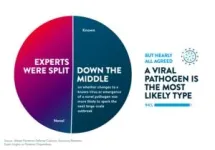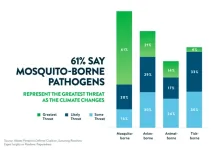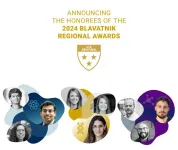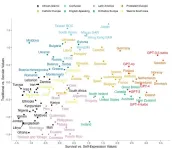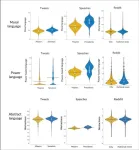(Press-News.org) New York, NY. September 17. The Lupus Research Alliance (LRA) is pleased to announce the recipients of the 2024 Career Development and Postdoctoral Awards to Promote Diversity in Lupus Research. Launched in 2021, the Diversity in Lupus Research (DLR) Awards aim to foster the development and productivity of exceptional early-career and postdoctoral scientists from underrepresented minority groups in science.
Lupus is a debilitating autoimmune disease that disproportionately affects Black, Hispanic, Indigenous, and Asian/Pacific Islander people. The LRA inaugurated the DLR Awards three years ago to foster a diverse scientific community that mirrors the populations most impacted by lupus.
“We are delighted to recognize the talented recipients of the 2024 LRA Diversity in Lupus Research Awards,” said Teodora Staeva, Ph.D., LRA Vice President and Chief Scientific Officer. “By supporting these outstanding individuals, we are not only broadening the diversity of our scientific community, but also paving the way for innovative approaches to drive advancements in lupus research.”
This year, three individuals will be awarded the DLR Career Development Award, which provides each investigator up to $600,000 over four years to help establish a competitive research program. The recipients are:
Carlos Castrillon, Ph.D., Emory University
Paul Hoover, M.D., Ph.D., Brigham and Women’s Hospital
Renita Horton, Ph.D., University of Houston
Additionally, two postdoctoral fellows will receive the DLR Postdoctoral Award, which provides each fellow up to $170,000 over two years to support their transition to independent research roles. The recipients are:
Rodrigo Cervantes-Díaz, Ph.D., Boston Children’s Hospital
Jonathan Lagos Orellana, M.D., Ph.D., Seattle Children’s Hospital
What Award Recipients Aim to Discover
Career Development Award to Promote Diversity in Lupus Research:
Carlos Castrillon, Ph.D., Emory University
B cells are immune cells that produce antibodies to identify and mark for destruction foreign invaders such as bacteria and viruses. B cells sense these invaders using their surface receptors, which then instruct B cells to activate. This process is kept in check by signaling inhibitors, which act like brakes to prevent B cells from overreacting. In lupus, these brakes are often less effective, and B cells are overly responsive. Dr. Castrillon aims to understand how these signaling inhibitors are controlled in lupus and explore whether restoring their effectiveness can help normalize B cell activity.
Paul Hoover, M.D., Ph.D., Brigham and Women’s Hospital
Lupus nephritis is a severe kidney disease affecting many people with lupus and often leads to kidney failure. Dr. Hoover helped discover a type of immune cell in the kidneys of people with lupus nephritis and mouse models called injury-associated monocytes, which are linked to severe disease. He will use cutting-edge technology to study how systemic lupus erythematosus (SLE) risk genes impact these cells and identify new therapies targeting them.
Renita Horton, Ph.D., University of Houston
Expectant mothers with certain lupus-related autoantibodies (antibodies that mistakenly target the body's own cells and tissues) are at a higher risk of having babies with congenital heart block, a serious heart condition. Dr. Horton developed a novel model called the congenital cardiac fibrosis chip to identify key factors that contribute to cardiac fibrosis (the formation of scar tissue) and heart disease in newborns. Her research aims to find biomarkers and therapeutic targets in order to treat or prevent fibrosis associated with neonatal (newborn) lupus.
Postdoctoral Award to Promote Diversity in Lupus Research:
Rodrigo Cervantes-Díaz, Ph.D., Boston Children’s Hospital
B cells, which play a key role in the development of lupus, are activated (turned on) by certain innate signals. Dr. Cervantes-Díaz will study how B cells respond to these signals in healthy people and those with lupus, tracking changes over time to understand how they go off course. He will also examine the impact of genetic variants (mutations) linked to lupus on B cell behavior so that targeted treatments can be developed.
Jonathan Lagos Orellana, M.D., Ph.D., Seattle Children’s Hospital
The role of B cells extends beyond antibody production. B cells also present small pieces of pathogens (foreign invaders) to other immune cells (in a process called antigen presentation), triggering an immune response. Antigen presentation may go awry in lupus. Dr. Lagos Orellana will explore how changes in antigen processing are related to the activation of self-reactive B cells (B cells that produce autoantibodies) in lupus in order to identify new therapeutic targets.
About Lupus
Lupus is a chronic, complex autoimmune disease that affects millions of people worldwide. Ninety percent of people with lupus are women, often striking during the childbearing years of 15-45. Black, Hispanic, Indigenous, and Asian/Pacific Islander people are disproportionately affected by lupus and are more likely to experience severe lupus symptoms. In lupus, the immune system, meant to defend against infections, produces antibodies that mistakenly recognize the body's own cells as foreign, prompting other immune cells to attack and potentially damage organs such as the kidneys, brain, heart, lungs, blood, skin, and joints.
About the Lupus Research Alliance
The Lupus Research Alliance is the largest non-governmental, non-profit funder of lupus research worldwide. The organization aims to transform treatment by funding the most innovative lupus research, fostering diverse scientific talent, and driving discovery toward better diagnostics, improved treatments and ultimately a cure for lupus. Because the Lupus Research Alliance’s Board of Directors funds all administrative and fundraising costs, 100% of all donations goes to support lupus research programs. For more information, please visit the LRA at LupusResearch.org and on social media at: X, Facebook, LinkedIn, and Instagram.
# # #
END
Survey reveals that infectious disease experts see the need to address gaps in surveillance programs to identify emerging pathogens, public health funding and testing infrastructure capabilities
They point to viral pathogens and mosquito-borne pathogens as likely to spark outbreaks as humans, animals and viruses overlap; and new viruses are as concerning as changes to existing viruses
Experts believe robust tracking of changing insect range, animal habitats and their migrations and extreme weather events are important to understanding infectious diseases and changing risk patterns
ABBOTT PARK, Ill., ...
In a new study, MIT physicists propose that if most of the dark matter in the universe is made up of microscopic primordial black holes — an idea first proposed in the 1970s — then these gravitational dwarfs should zoom through our solar system at least once per decade. A flyby like this, the researchers predict, would introduce a wobble into Mars’ orbit, to a degree that today’s technology could actually detect.
Such a detection could lend support to the idea that primordial black holes are a primary source of dark matter throughout the universe.
“Given decades of precision ...
Images
A key step toward reusing CO2 to make sustainable fuels is chaining carbon atoms together, and an artificial photosynthesis system developed at the University of Michigan can bind two of them into hydrocarbons with field-leading performance.
The system produces ethylene with efficiency, yield and longevity well above other artificial photosynthesis systems. Ethylene is a hydrocarbon typically used in plastics, so one direct application of the system would be to harvest carbon dioxide that would otherwise be vented into the atmosphere for making plastics.
"The performance, or the activity and stability, is about five to six times better than what is typically reported ...
Doctors and pharmacists treating people with blood thinners can reduce the rate of inappropriate dosing — as well as blood clots and strokes that can result from it — using an electronic patient management system, a study suggests.
The online dashboard, developed by the United States Veterans Health Administration in 2016, was designed to highlight and optimize the treatment of patients with direct oral anticoagulants, or DOACs, the most commonly prescribed blood thinners.
Researchers led by Michigan Medicine used the tool to assess over 120,000 cases in which patients with atrial fibrillation or venous thromboembolism, blood clots in the veins, were treated with ...
UPTON, N.Y. — The Blavatnik Family Foundation and the New York Academy of Sciences have recognized chemical engineer Juan Jimenez as a Finalist in the 2024 Blavatnik Regional Awards for Young Scientists. Jimenez’s catalysis science research at the U.S. Department of Energy’s (DOE) Brookhaven National Laboratory opens doors for turning climate change-driving gases into industrially useful materials.
The yearly honor is awarded to distinguished early career researchers at institutions in ...
NEW YORK – September 17, 2024 – The Blavatnik Family Foundation and The New York Academy of Sciences today announced the three Laureates and six Finalists of the 2024 Blavatnik Regional Awards for Young Scientists. The Awards honor outstanding postdoctoral scientists from academic research institutions across New York, New Jersey, and Connecticut.
The Blavatnik Regional Awards jury, consisting of distinguished scientists and engineers, selected one Laureate in each category who will receive a $30,000 unrestricted prize and two Finalists in each category who will be awarded $10,000 ...
People selectively underestimate how rich the world’s richest people are, according to a study. Increasing income inequality in many countries is driven by steep gains among the top 1% of earners. In the United States, support for policies that would redistribute wealth has not increased since the 1970s, even as the share of incomes held by the top 1% of Americans jumped from 10% to 19%. Barnabas Szaszi and colleagues conducted four studies to explore how well people understand the wealth held by others. In one study, 990 US residents ...
A study finds that ChatGPT expresses cultural values resembling people in English-speaking and Protestant European countries. Large language models, including ChatGPT, are trained on data that overrepresent certain countries and cultures, raising the possibility that the output from these models may be culturally biased. René F Kizilcec and colleagues asked five different versions of OpenAI’s GPT to answer 10 questions drawn from the World Values Survey, an established measure of cultural values used for decades to collect data from countries around the world. The ten questions place respondents ...
A study of political speeches, social media posts from politicians, and Reddit discussions among everyday users finds a higher prevalence of abstract, moralized, and power-centric language in national versus local politics. Political dialogue and debate in the United States has largely shifted from the local to the national in recent years, in part due to the decline of local news media. However, national discussions lack the concrete common ground that comes from shared place-based knowledge. Danica Dillion and colleagues studied how this shift is affecting ...
A study uses body-worn camera footage as a source of data on police-community interactions. Nicholas Camp and colleagues analyzed transcripts from 615 police stops made in California by Oakland Police Department police officers before and after a procedural justice training, which focused on officer communication in routine traffic stops. The training included findings by the authors in a previous study that showed officers used more respectful language with White drivers than with Black drivers during traffic stops. The training ...

